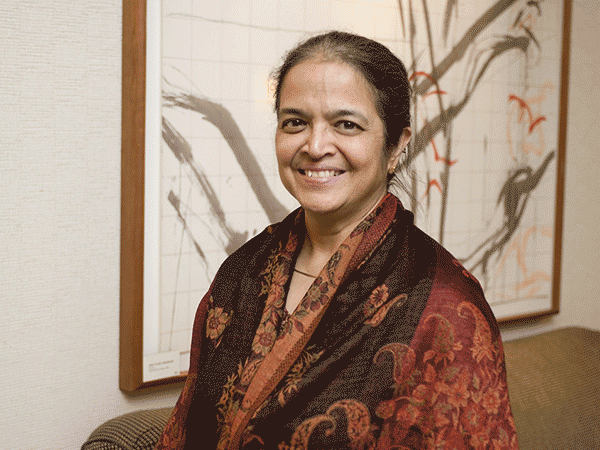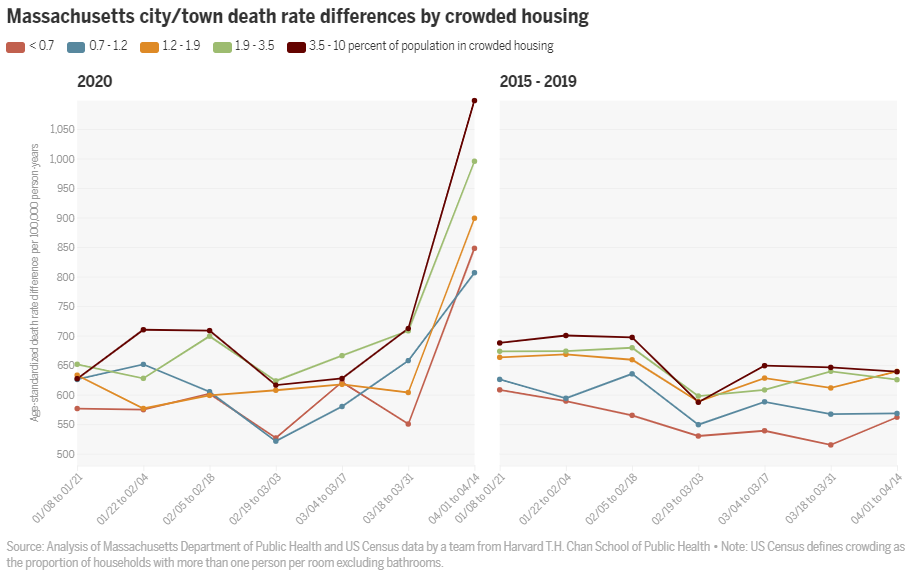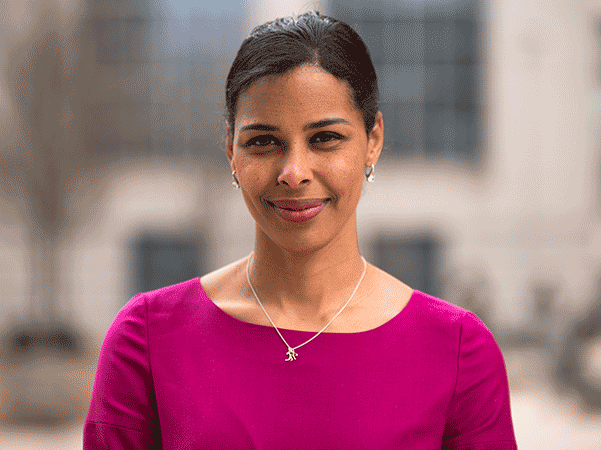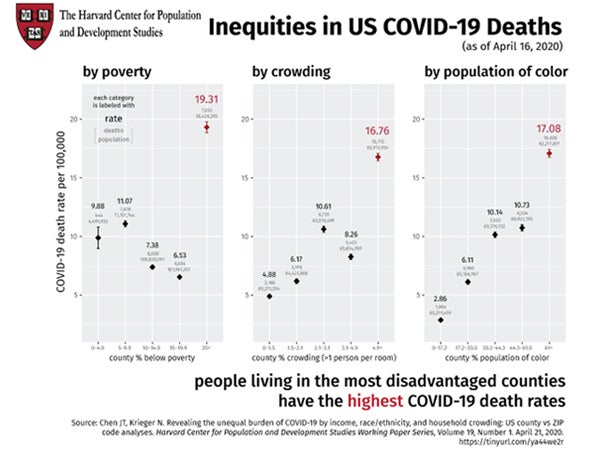Professor of global health and population Gita Sen, PhD, has collaborated on a Commentary published in The Lancet that warns about how the coronavirus pandemic is stressing the The Global Strategy for Women’s, Children’s and Adolescents’ Health (2016-2030) efforts to reach its target goals. She was also interviewed in The Jakarta Post and shares her views about the “backlash against gender equality.” “We are living in deeply unsettling times. The…
Novel study reveals an unequal surge in COVID-19 mortality rates in Massachusetts by poverty level, race and crowded housing
A Harvard Pop Center working paper reveals the findings of an analysis of State-provided public health data by Harvard T. H. Chan School researchers Jarvis Chen, Pamela Waterman, and Nancy Krieger. The Boston Globe obtained the data and shared it with the researchers in order to generate this novel analysis. Read more in The Boston Globe, and in this Harvard T.H. Chan School of Public Health news item. Graphic…
More federal funds are needed to help low-income children get adequate nutrition during school closures
Public health policy professor Sara Bleich makes the case in this interview for why additional federal funding for schools needs to be part of future relief legislation, as well as increased SNAP benefits.
Working paper shows people living in most disadvantaged U.S. counties have highest COVID-19 death rates
A Harvard Pop Center working paper by Jarvis Chen and Nancy Krieger provides critical public health monitoring data—missing until now—on the unequal economic and social burden of COVID-19 in the United States. The Harvard Center for Population and Development Studies (HCPDS) Working Paper Series provides a flexible and timely outlet for affiliates to publish their work in progress to the scholarly community in an open-access form.
Mothers in India who experienced neonatal death of child found to be at increased risk of additional neonatal deaths
Harvard Pop Center faculty member S (Subu) V Subramanian, PhD, and visiting scientist Rockli Kim, ScD, are among the authors of a study published in the JAMA Open Network that could help to identify high-risk pregnancies and potentially reduce the neonatal mortality rate in India. Read the Harvard T.H. Chan School of Public Health website.
Social scientist David Williams says COVID-19 is a call to action for a ‘Marshall Plan’ for disadvantaged communities
The Chicago Sun Times reports on a Robert Wood Johnson Foundation teleconference with Professor David Williams, PhD, during which he explained how the coronavirus is bringing to light the health disparities that “reflect longstanding policies that have created pervasive social and economic inequalities in the United States.”
Can the socioeconomic status of a neighborhood influence the cognitive health of its residents?
A study published by researchers affiliated with the French Constances cohort (a nationally representative sample of 200,000 adults aged between 18 and 69) reveals that neighborhoods suffering from socioeconomic deprivation were linked to cognitive impairment. Harvard Pop Center Director Lisa Berkman, PhD, is co-PI on the project and one of the study authors.
Adolescents identifying as sexual minority found to be 3 times more likely to attempt suicide than heterosexual peers
Three researchers affiliated with the Harvard Pop Center* are among the authors of a study in Pediatrics that looked at changes in US adolescent reported sexual orientation and suicide attempts by sexual orientation from 2009–2017. Authors on the study include: Julia Raifman, Brittany M. Charlton, Renata Arrington-Sanders, Philip A. Chan, Jack Rusley, Kenneth H. Mayer, Michael D. Stein, S. Bryn Austin and Margaret McConnell*. Photo: Seven Seas of Rhye on…
Jason Beckfield: “Rising inequality is not balanced by intergenerational mobility”
Jason Beckfield, our associate director and Harvard sociologist, COMMENTS on a study that documents intergenerational social mobility over the past 165 years, applauding the study’s strengths (e.g., differentiating between relative and absolute mobility; large amount of data) and outlining some of its limits (e.g., ethnicity and gender are weak spots in population composition; lack of explanation).
When is the best time to prevent early childhood obesity?
Harvard Pop Center faculty members Tracy Richmond, Mauricio Avendano, and Ichiro Kawachi, along with their colleague Inyang A. Isong, have published a study that takes a longitudinal look at the weight and growth status of kindergarten-aged children from various racial/ethnic backgrounds.








